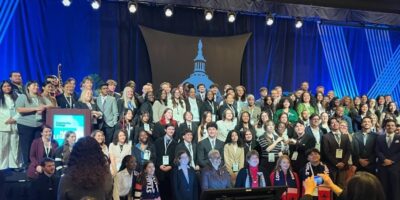“The government you elect is the government you deserve.”
–Thomas Jefferson
“The greatness of America lies not in being more enlightened than
any other nation, but rather in her ability to repair her faults.”
–Alexis de Tocqueville
While the last of the votes are still being counted in some parts of the country, the outcome of last Tuesday’s election was clear within hours of the polls closing: Former President Donald Trump will be returning to the White House after decisively defeating Vice President Kamala Harris by capturing both the Electoral College and the popular vote.
In the process, he managed to win all seven of the “swing states” and shift every demographic group rightward, including many traditionally reliable Democratic voting blocs like Black, Latino, and younger, college-age voters.
Like the rest of the country, college students had a range of opinions on their way to the polls, and have mixed feelings about the results.
Whatever reaction you may be having, here are a few thoughts, some encouraging and some cautionary, about the outcome and what it may mean for NECC and our students.
America’s democracy is working.
While democracies around the world have been crumbling in recent decades, and the state of our own republic is increasingly in doubt, our 2024 national election worked as it should.
Voters in 2024 were given a choice between two very different major party candidates for president:
A candidate who many people (a majority as it turns out) thought of as a strong (bloody-eared survivor, anyone?), straight-talking, man-of-the-people who will fix what they think is going wrong with the nation; and others considered to be a boorish, dishonest, self-centered authoritarian who tried to overthrow the government.
And a candidate who many people (though a minority of voters) thought of as a smart, determined, relatable (coconut memes, anyone?), advocate for social justice who might finally break the “glass ceiling” for women and the presidency; and others viewed as opportunistic, overly progressive, vague on policy, and too connected to the inflation and low popularity of the outgoing Biden administration.
And the people have spoken.
Money did not buy this election. Since becoming the Democratic candidate in July, Kamala Harris’ campaign raised and spent over a billion dollars, more than double Republican Donald Trump’s $400 million campaign haul during the same period. Yet Harris still lost.
And despite concerns that the election would be marred by mistakes or fraud, too close to call, and that results would take weeks or months of litigation, possibly accompanied by rioting in the streets, so far all has been, well, ordinary.
More than 80 million people, about 40% of registered voters, cast absentee ballots or appeared for early in-person voting this year, which for the most part ran quite smoothly, while the rest turned up at one of nearly 100,000 polling places across the country on election day.
With more than 140 million votes cast, Vice President Harris conceded to President-elect Trump late Tuesday night, and President Biden called his predecessor/successor the next day, as nearly every president in history has done before him, to offer his assistance with an orderly transition of power.
Other than disappointed social media posts and snarky routines by late-night comics, no shots have been fired.
Election doubters, take heart.
And, America’s democracy is still in peril.
Yes, Vice President Harris conceded the night of the election while results were still rolling in; President Biden has committed to an orderly transition; and Democrats, instead of rioting in the streets, are doing what the losing party traditionally does after a long, hard-fought race: trying to figure out what worked, what didn’t, and how to do better next time.
Make no mistake, however: Democracy also worked in this election because the Republican party’s candidate won, and the Democratic party’s candidate lost. Had the results been reversed, we likely would be in a very different place today.
In 2020, outgoing President Joe Biden won the election with 81 million votes, just over 51% of votes cast and enough in battleground states to gain 306 electoral college votes. Meanwhile, Donald Trump lost with 74 million votes, 47% of votes cast and only 232 electoral college votes.
Last Tuesday, President-elect Trump won the election with just under 75 million votes, around 51% of votes cast and earned 312 electoral college votes; while Kamala Harris lost with 71 million votes, 48% of votes cast and 226 electoral college votes.
In both elections, the winning and losing candidate received nearly the same proportion of both the popular vote and the electoral college vote, but one candidate, Donald Trump, and many members of his party, despite having no evidence and more than 60 court losses, continue to deny the outcome and cast doubt on the integrity of America’s election process.
Back in 2020, then outgoing President Trump never conceded, did not assist with the transition to the Biden administration, and on January 6, encouraged his followers to “stop the steal.”
In the weeks leading up to last Tuesday’s election, Trump continued to make false claims about election officials using early voting to commit fraud, widespread voting by noncitizens, and other thoroughly debunked conspiracy theories amplified endlessly in social media echo chambers.
In recent years, Americans’ confidence in national institutions, such as Congress, the presidency, banks, public schools, the media and the criminal justice system have fallen to historic lows.
While there are many reasons for this American skepticism, one of the greatest may simply be that we are being told repeatedly that America and its institutions are broken (mostly by conservatives) or are systemically flawed (mostly by progressives).
Yes, our democracy worked last Tuesday, but it is struggling and will remain vulnerable until we get back to a place where both parties and all candidates acknowledge that the country’s election process, with whatever minor faults it may have, is fundamentally sound.
Indeed, it is one of the best and most enduring in the world.
We are becoming less politically divided by race and gender.
Historically, men are more likely to vote for Republicans and women are more likely to vote for Democrats.
Despite the prospect of her becoming the first female United States president in history, though, Kamala Harris actually received a smaller proportion of women’s votes in 2024 than Joe Biden did in 2020. Younger women were slightly more likely to vote for Harris than Trump, and older women were almost evenly divided.
And historically, White voters are more likely to vote for Republicans, while Black and Latino voters turn out overwhelmingly for Democrats.
This happened last week, with Black and Latino voters still turning out predominantly for Harris and the Democrats, but Trump made enormous gains, doubling his share of Black voters (from 8-16%) and significantly increasing his proportion of Latino voters (from 35-42%).
The shift was significant even here in reliably blue Massachusetts, where Trump gained points in Gateway Cities with large Latino populations like Lynn, Revere and Chelsea.
Nowhere, though, shifted more than Lawrence, the “Immigrant City,” home to 30% of NECC’s students, where Spanish is more common than English, and more than 80 percent of the city’s residents identified as Latino in the 2020 census.
The Democrats’ advantage has been slipping in Lawrence for the last few elections: In 2016 Hilary Clinton received 82 percent of the city’s votes, while in 2020 Biden dropped to 74 percent, and last week Harris only pulled in 59 percent.
Many analysts of these trends are noting that voters’ feelings about the economy played a more important role in who they supported than their individual racial or gender identity.
We are becoming more politically divided by education.
During his first bid for the White House in 2016, President-elect Donald Trump famously remarked to one of his rally crowds in Nevada, “I love the poorly educated.”
In his usual blunt way, Trump laid bare one of the fastest growing differences between the Republican and Democratic parties: For the past few decades, and especially following the “College for All” years of the Obama administration, Americans with college degrees have been far more likely to vote for Democrats, while a majority of those without vote Republican.
Exit polls for this year’s election indicate that only 42% of college graduates voted Republican, compared to 56% without a degree, a 14-point gap that has doubled since 2020 when it was only 7 points.
The more educated someone is, the even likelier they were this year to vote for Democrats: According to the Chronicle of Higher Education, only 41% of community college graduates with associate degrees voted for Kamala Harris, while 53% of bachelor’s degree holders and 59% of those with graduate degrees supported her.
Despite Americans’ increasing doubts about the value of a college degree, without question it is still the ticket to family-sustaining higher wages, retirement benefits, better health, and even a longer life.
Still, only 38% of American adults have a bachelor’s degree and any political party that focuses too narrowly on issues that matter most to these voters will win fewer elections.
Comprehensive Immigration Reform is More Important Than Ever
Whoever your candidate and whatever your party, chances are you are not happy with America’s immigration policies, and your dissatisfaction played a part in how you voted.
Republicans won the presidency, took back the Senate, and are poised to keep control of the House of Representatives in this election with a platform that criticized the Biden administration’s “open border” policies and a presidential candidate who has vowed to deport 11 million people living in America without legal status on his first day in office.
Democrats, meanwhile, have championed lenient immigration practices for refugee and asylum seekers, frequent use of Temporary Protected Status (TPS) to help people fleeing conflicts and natural disasters, and a path to citizenship for “Dreamers” (young people without legal status who have grown up in America).
This stalemate has lasted nearly forty years: The last time Congress passed meaningful legislation addressing immigration was in 1986.
Back then, when President Ronald Reagan signed the Immigration Reform and Control Act in a ceremony next to the Statue of Liberty, he noted, “The legalization provisions in this act will go far to improve the lives of a class of individuals who now must hide in the shadows, without access to many of the benefits of a free and open society.”
How times have changed.
Decades ago, both parties and their leaders recognized that America was founded by immigrants, and that our core strength as a nation relied on being a beacon of hope and opportunity to the rest of the world, with an orderly path for joining in the Great American Experiment.
The facts strongly support this view.
Despite inflammatory rhetoric about violent immigrants stealing jobs and bankrupting benefit programs, the reality is that immigrants are less likely to commit crimes than native-born Americans, contribute positively to the workforce, are not eligible for most federal benefits and access them at lower rates than U.S. citizens (even as they pay more into benefit programs than they take out).
According to a recent Boston University study, Massachusetts, which has the fifth highest immigrant population in the nation, relies heavily on immigration to counter our state’s outmigration (last year, 40,000 residents left the Commonwealth, while 51,000 immigrants arrived), and to fill highly-skilled jobs in industries fueled by science and technology, as well as lower-skilled, lower-paying jobs in agriculture, construction, and healthcare.
Last year, the Massachusetts Business Roundtable—a public policy organization of more than 90 CEOs and senior executives from large employers across the Commonwealth—issued a report, “Tapping Untapped Talent: How Foreign-Educated Immigrants Can Strengthen the Massachusetts Economy,” that details why and how the state should develop policies to help immigrants overcome barriers and join the workforce in even greater numbers.
Still, popular opinion about immigrants has been changing, even in highly progressive Massachusetts, as thousands of migrant families from Nicaragua, Venezuela, and especially Haiti (Massachusetts has the third largest Haitian diaspora in the country) have arrived, mostly with legal status, and put pressure on the state’s resources and especially its “Right to Shelter” law.
As a result, when the state’s shelters filled up with 7,500 families earlier this year and the cost to support migrant families climbed above $1 billion, Governor Healey and the legislature imposed new restrictions on access to emergency shelters that prioritizes displaced Massachusetts residents over migrants and limits the amount of time families are able to stay in subsidized housing.
Like nearly every other step taken by governors, state legislatures, local sheriffs, non-profit organizations, philanthropists, and presidents over the past few decades, it is temporary—a band aid over a gaping wound that won’t be healed until Congress takes action.
In a 2021 New York Times column that pointed out how, as a result of the Congressional stalemate we are actually experiencing the worst of both immigration worldviews, Thomas Friedman argued that when crafting new immigration legislation, “We Need a High Wall with a Big Gate.”
America, like every nation, must tend to its national security and, as much as many might like to, cannot afford to have truly open borders, so we must have some kind of system in place to manage immigration: a literal or figurative “high wall.”
At the same time, we are a nation of immigrants and our population, our culture, our workforce, our innovation economy, and our future as a global model of democracy all depend on the continued migration of people from other parts of the world to our shores: a literal or figurative “big gate.”
What does all this mean for NECC and our students?
In our classes and degree programs, students at NECC learn history, how governments work, written and verbal communication strategies, information literacy and critical thinking skills, along with some level of global awareness and cultural competency.
Equipped with this knowledge and these abilities, we are hopeful they will find meaningful careers and ways to contribute productively to their communities and in American society more broadly, whatever their political persuasion may be.
There is work ahead for our students and all of us to combat misinformation and to restore well-founded trust in our system of elections, win or lose.
There is also work to be done to push past recent identitarian politics, to recognize that race, ethnicity and gender are not the only, or perhaps even the most significant, indicators of who our fellow citizens are and what they most want from our shared society.
And work is most certainly needed to address, for this generation, comprehensive immigration reform, beginning with those things most Americans agree with:
- A path to citizenship for certain undocumented immigrants already in the country, especially Dreamers (DACA recipients) brought to America as young children;
- Increased border security and technology to more effectively manage migration;
- Streamlining legal immigration by clarifying eligibility requirements, enabling more skilled workers, adding staff, particularly immigration hearing judges, and reducing backlogs; and
- Ensuring humane treatment of all immigrants, including asylum seekers, while working to address the root causes of migration through foreign policy and aid.
Until this is accomplished, I am mindful that NECC was New England’s first federally designated Hispanic Serving Institution and one of our campuses is in Lawrence, Massachusetts, long-known as the “Immigrant City.”
We have a responsibility to the students and communities we serve.
We have been leaders, through accomplishments such as last year’s Tuition Equity Bill, in advocating for Dreamers, undocumented young people who have grown up in the United States.
And we have been leaders, through innovations like the award-winning PIES Latinos de NECC, in providing credentials and preparation for immigrants from around the world to join our workforce.
We are proud of our heritage, steadfast in our mission, and we will continue to ensure that all of our students, whatever their citizenship status, have accurate information about their rights and access to supportive resources.
America is a nation of immigrants and a nation of laws.
We are a nation of ideals and aspirations unmet and a nation of contradictions.
America is a nation deeply rooted in our history, and a nation with a citizenry and a culture that is constantly changing.
We are also a nation with a democracy that is working.
And whether you are celebrating or lamenting the outcome of last Tuesday’s election, you will have the opportunity four years from now, and every day until then, to let your voice be heard.






